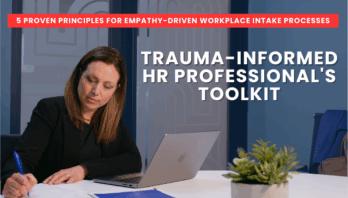Yes. And here’s what HR professionals needs to know under Ontario law.
When it comes to workplace harassment, many HR professionals assume a formal complaint must be filed before an investigation is triggered. That’s a dangerous misconception – and one that can put your organization at legal risk.
Under Ontario’s Occupational Health and Safety Act (OHSA), employers have a duty to investigate even if no official complaint is made.
In other words: if you’re aware of problematic behaviour – whether through a witness report, an offhand comment, or a leadership observation – you may be required to take action.
What Does the Law Actually Say?
Section 32.0.7 of the OHSA requires that an investigation “appropriate in the circumstances” be conducted into incidents or complaints of workplace harassment, including sexual harassment.
But courts and legal precedents have clarified that a formal complaint is not necessary to trigger this duty.
For example:
- An employee venting to a manager in confidence
- A supervisor witnessing inappropriate conduct
- Rumors or repeated jokes that suggest an unhealthy dynamic
These are all situations where the employer may be obligated to investigate. Even if the affected employee never submits a written complaint.
Why This Matters for HR
Failing to investigate when concerns are known (even informally) can:
- Violate legal obligations under OHSA
- Expose the company to liability under the Human Rights Code
- Undermine employee trust and psychological safety
- Lead to reputational damage if the issue escalates
So How Do You Know When to Investigate?
Start with a threshold assessment.
If the alleged conduct—if true—would violate your internal policies, the OHSA, or the Human Rights Code, you should move forward with an investigation.
Even if it doesn’t meet that threshold, you may choose to investigate anyway to:
- Demonstrate that concerns are taken seriously
- Uncover underlying issues before they escalate
- Maintain a respectful and safe work environment
What About Anonymous Reports or Indirect Feedback?
You’re still responsible for acting on them.
The test isn’t whether the concern is fully substantiated—it’s whether you’re reasonably aware of behaviour that may constitute harassment or misconduct.
Document the issue, follow your intake process, and determine next steps with objectivity and care.
What Happens If You Don’t Investigate?
You could face:
- Orders or penalties from the Ministry of Labour
- Human Rights Tribunal claims
- Loss of trust among employees
- Legal exposure in wrongful dismissal or constructive dismissal claims
Bottom Line
If you know, you owe. HR professionals must take all reasonable steps to investigate workplace harassment concerns, even when no one files a formal complaint.






